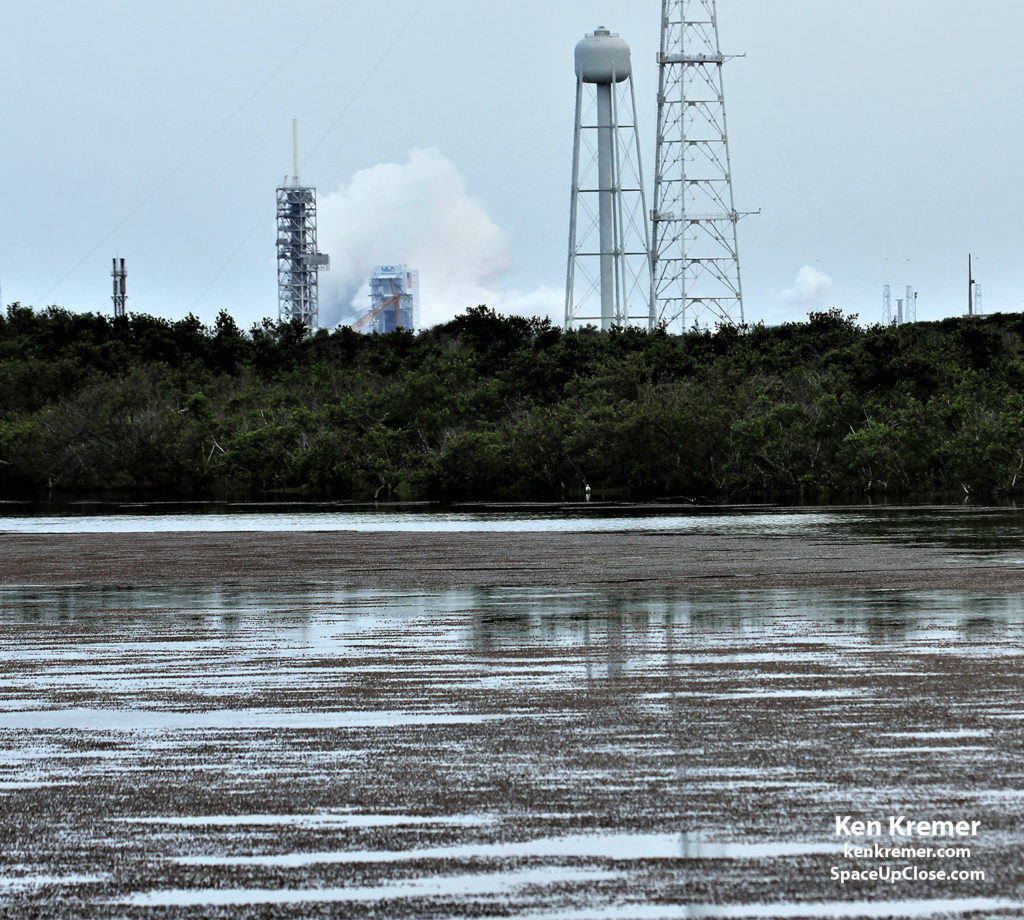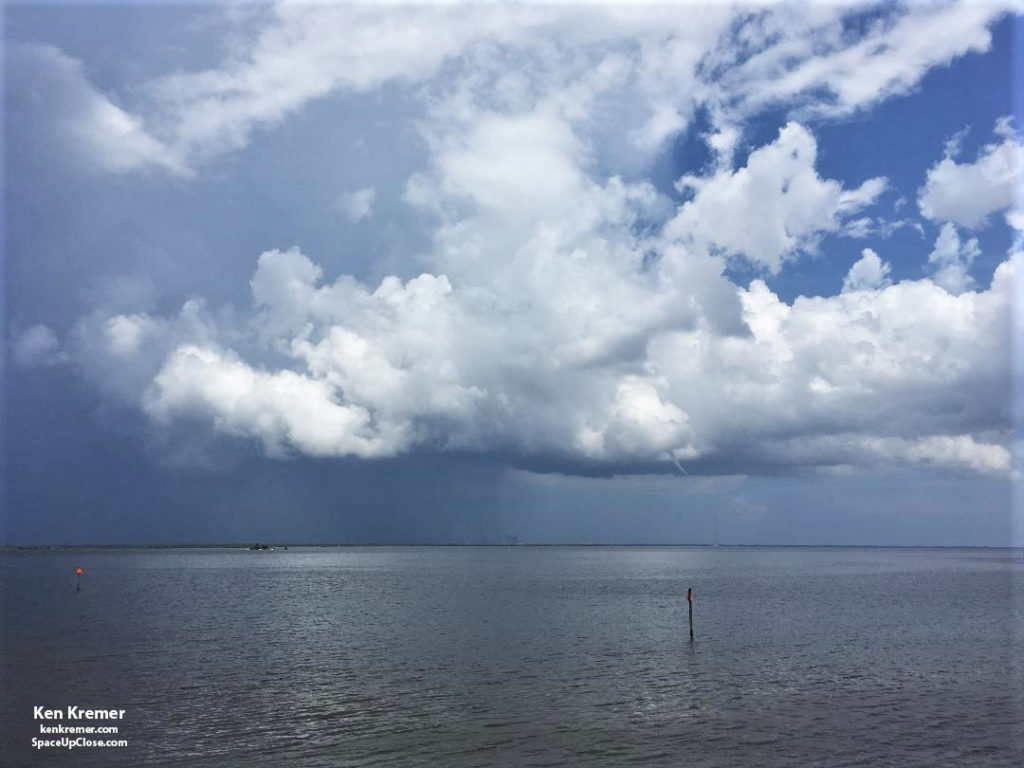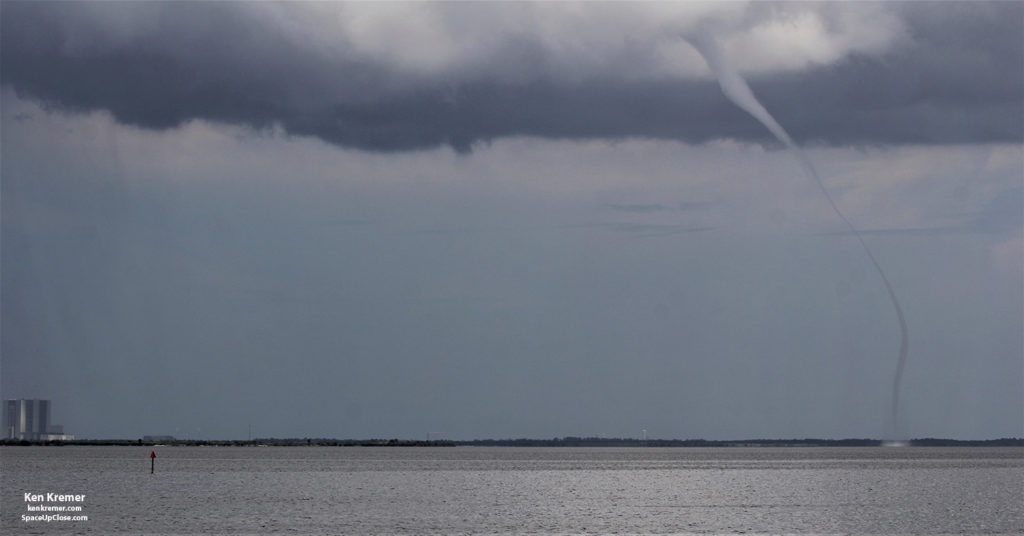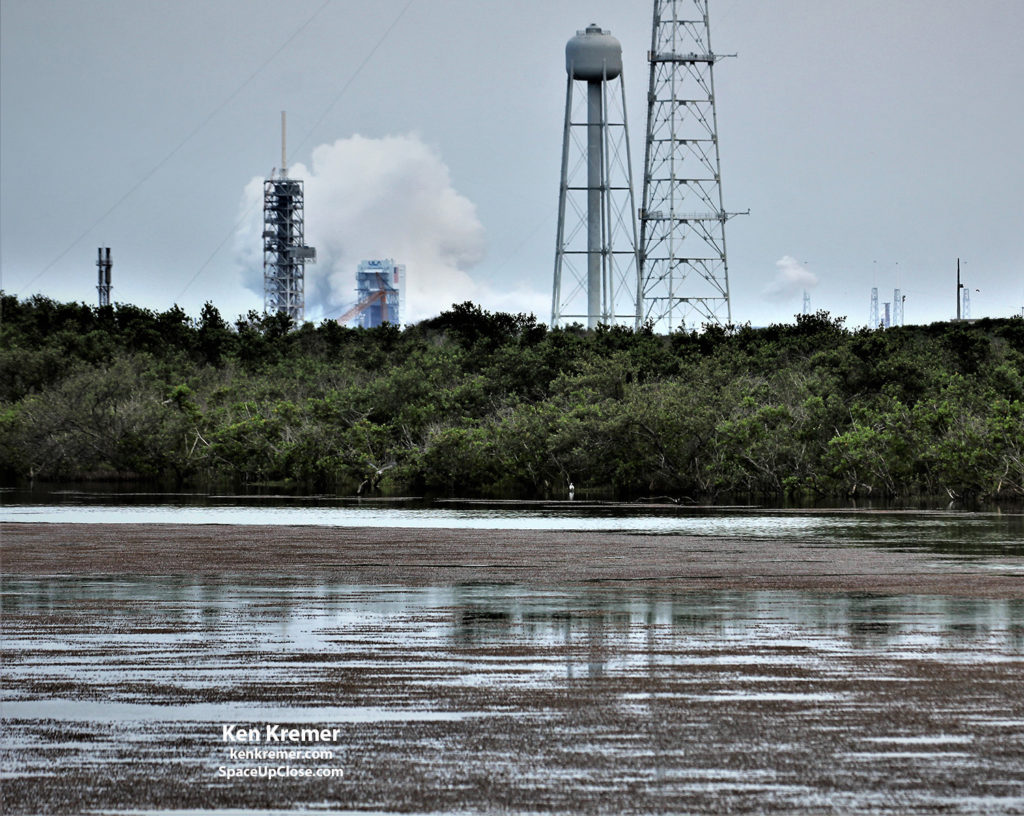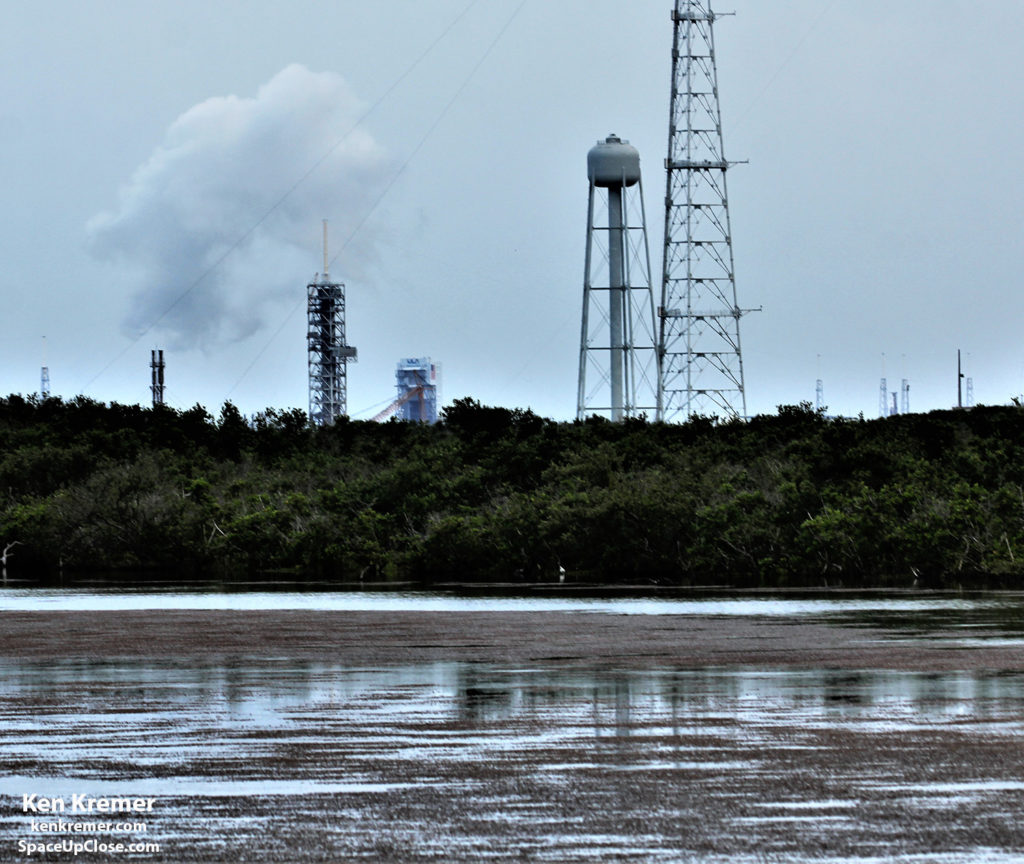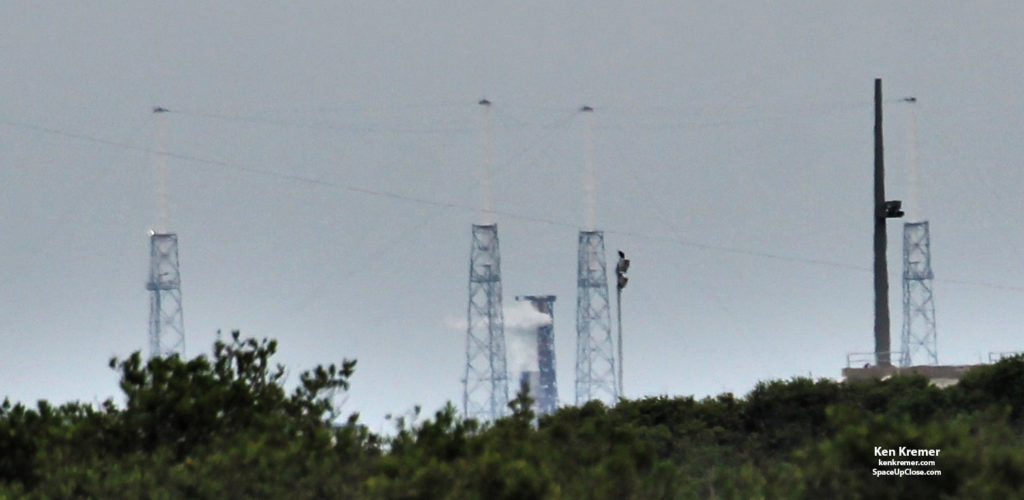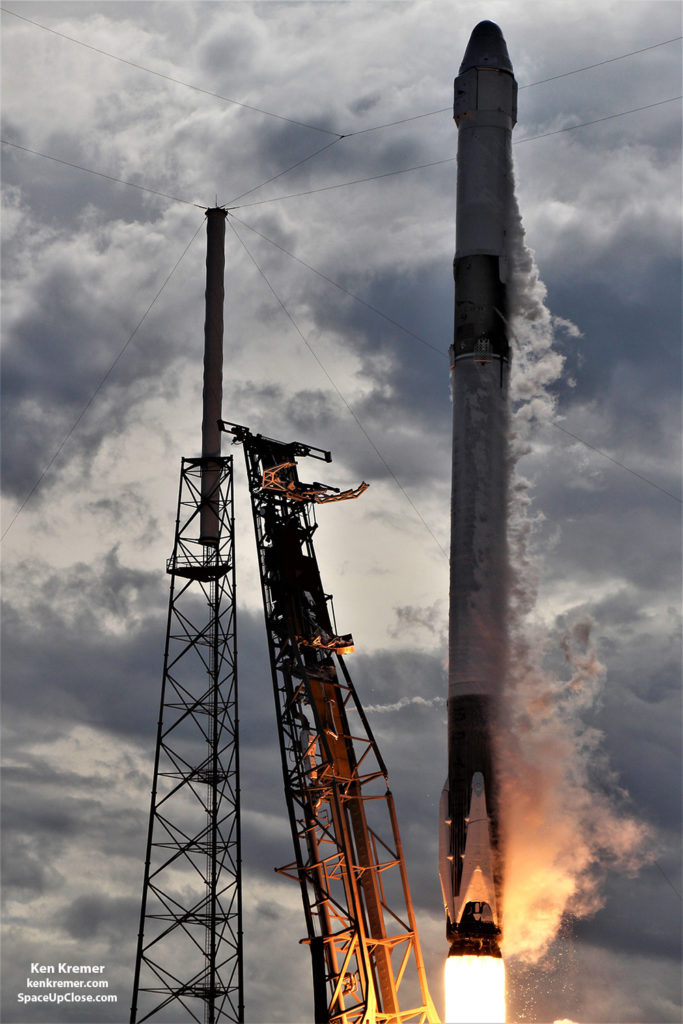CANAVERAL
NATIONAL SEASHORE, FL – After touch and
go wild weather passed over the Kennedy Space Center and Cape Canaveral, SpaceX
engineers at last got the go for fueling and squeezed in a static fire engine test
of their reused Falcon 9 booster last this afternoon, June 23, that clears the
way for a NASA contracted resupply mission to the International Space Station next week from
the Florida Space Coast.
Multiple periods
of thunder and rain showers passing over the Cape accompanied by a magnificent
water spout
backdropped by NASA’s iconic VAB on the Indian River and dark clouds that totally obscured the pad from view for over an
hour delayed the critical engine test for about an hour.
Blastoff of the ‘used’ SpaceX Falcon 9 and Dragon CRS-15
commercial cargo freighter is now slated for dawn Friday, June 29 at 5:42 a.m. EDT (0942 GMT) from Space Launch Complex 40 at Cape Canaveral Air Force Station in Florida.
Dragon CRS-15 is
loaded with nearly 3 tons of science and supplies for the six person crew aboard
the ISS.
Check out my
exclusive Space UpClose photos capturing the test firing, water spout and wild weather
this Saturday afternoon, June 23.
The SpaceX team successfully ignited all nine Merlin 1D first stage engines for a brief firing lasting several seconds in duration of the recycled
Falcon 9 vehicle at 5:30 p.m. EDT on pad 40 at Cape Canaveral, FL.
SpaceX confirmed the
positive test outcome by tweet soon thereafter.
complete—targeting June 29 launch from Pad 40 in Florida for Dragon’s fifteenth
mission to the @Space_Station” SpaceX tweeted.
and Dragon cargo ship are recycled from earlier missions. The Falcon 9 booster
recently launched NASA’s TESS exoplanet hunter – barely 2 months ago – and the Dragon flew on the CRS-9
cargo delivery mission,
2 years ago.
flight-proven,” said SpaceX.
of the Falcon 9 booster which is being discontinued in favor of the Block 5. The firm is rapidly switching
over to the new Block 5 version first launched in May.
easier to turnaround with minimal maintenance, says SpaceX CEO Elon Musk. His
goal is to relaunch a recovered Block 5 a second time within 24 hours by sometime
next year.
rather iffy all afternoon with rain, dark threatening clouds and dozens of thunderclaps
in the vicinity and distance.
was totally unexpected, and I’ve never photographed one in such detail. See hi
res image below.
During the engine test all nine Merlin 1D first stage
engines were ignited for several seconds.
fire test, the rocket’s first and second stages are fueled with liquid oxygen
and RP-1 propellants just like an actual launch, and a simulated countdown is
carried out to the point of a brief engine ignition.
vigorous venting from the Falcon 9 second stage in the final minutes and moments
before ignition.
down engine test with the erected Falcon 9 rocket involved the ignition of all
nine Merlin 1D first stage engines generating some 1.7 million pounds of thrust
at pad 40 while the two stage rocket was restrained on the pad – minus the
Dragon payload.
show! It appeared to last for about three seconds and generated a sudden, loud and
roaring sound during the test, along with a huge exhaust plume of white smoke and steam rushing
out of the ocean facing flame trench.
The plume wafted around in the wind and dissipated within 5
minutes. It was somewhat surprising and
quite lucky that the stormy weather drifted away for just enough time to
conduct the required test.
hanger to attach the Dragon spacecraft.
The 20-foot high, 12-foot-diameter Dragon CRS-15 vessel is jam packed with more than 5,900 pounds
(about 2,700 kilograms) of science experiments, research hardware, space parts,
food water, clothing and more supplies for the six person Expedition 56 crew.
studies the use of artificial intelligence, plant water use all over the
planet, gut health in space, more efficient drug development and the formation
of inorganic structures without the influence of Earth’s gravity, according to
NASA.
on July 2 for a month long
stay.
from pad 40.
in 2018 and the 2nd ISS resupply mission for NASA in 2018.
Watch for Ken’s continuing onsite coverage of NASA, SpaceX, ULA,
Boeing, Lockheed Martin, Orbital ATK and more space and mission reports direct
from the Kennedy Space Center, Cape Canaveral Air Force Station, Florida and
Wallops Flight Facility, Virginia.
Stay tuned here for Ken’s continuing Earth and Planetary science and human
spaceflight news: www.kenkremer.com
–www.spaceupclose.com – twitter @ken_kremer – email: ken at kenkremer.com
SpaceX Falcon 9/CRS-15 launch to ISS, SES-12 comsat launch, Falcon Heavy, TESS, GOES-S, Bangabandhu-1,
NASA missions, ULA Atlas & Delta launches, SpySats and more at Ken’s
upcoming outreach events at Kennedy Space Center Quality Inn, Titusville, FL,
evenings:
27-29: “SpaceX Dragon CRS-15
resupply launch to ISS, SpaceX Falcon Heavy & Falcon 9 launches, SpaceX SES-12
comsat. ULA Atlas USAF SBIRS GEO 4 missile warning satellite, SpaceX GovSat-1,
CRS-14 resupply launches to the ISS, NRO & USAF Spysats, SLS, Orion, Boeing
and SpaceX Commercial crew capsules, OSIRIS-Rex, Juno at Jupiter, InSight Mars
lander, Curiosity and Opportunity explore Mars, NH at Pluto and more,” Kennedy
Space Center Quality Inn, Titusville, FL, evenings.
Photos for sale


